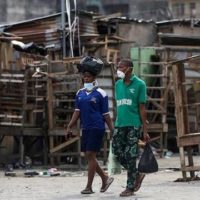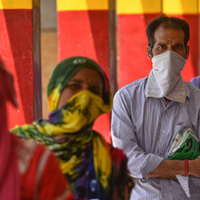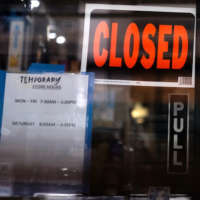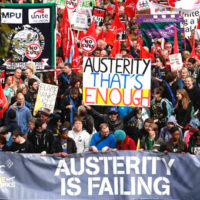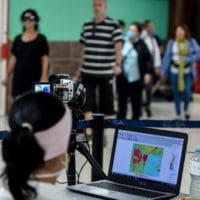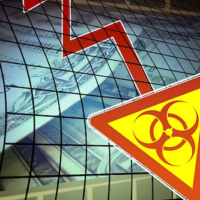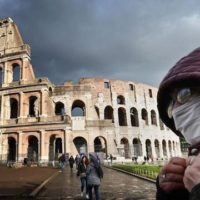-
The economic crash is already ravaging Africa
Sub-Saharan Africa is facing its greatest crisis in generations. The continent thus far has been less affected by the pandemic than other parts of the world. But the impact of the global economic crisis is already enormous.
-
ILO: Nearly half of all world’s workers may lose their jobs due to COVID-19 pandemic
In the absence of strong support measures by governments across the world, the estimated loss of mostly informal jobs would result in rising poverty, starvation and inequality, an ILO report says.
-
The exodus of finance from the third world
There is an exodus of finance from the third world at present, far exceeding in scale what had occurred in 2008 after the financial crisis.
-
A crisis like no other: social reproduction and the regeneration of capitalist life during the COVID-19 pandemic
As the COVID-19 health crisis deepens, it looks increasingly clear that the short-term collapse in global output is likely to exceed that of any recession in the last 150 years–that is, in the entire history of capitalism. The ILO estimates that the crisis will lead to the destruction of 195 million jobs. Hence, after discussing at length the epidemiology of the COVID-19 pandemic, media attention is now increasingly focused on how to restart the global economic engine.
-
The pandemic and the global economy
Developing countries face collapsing international trade, falling remittances, sharp reversals of capital flows, and currency depreciation. Only bold policies—debt relief, international financing, planning, and more—will avert further catastrophe.
-
Capitalism’s weak doses of socialism to treat the economic infection of COVID-19
The same proposals that were demonized yesterday as radical socialism are embraced today to save the society from collapse.
-
Coronavirus, crisis, and the end of neoliberalism
Suddenly, we find ourselves in a transformed world. Empty streets, closed shops, unusually clear skies, and climbing death tolls: something unprecedented is unfolding before our eyes.
-
Why coronavirus could spark a capitalist supernova
There is no magic money tree – the ‘rescue packages’ aim to rescue a rotten system, and won’t work.
-
The Coronavirus depression requires a new approach to budgeting
Congress recently passed a 1.5-1.7 Trillion dollar stimulus bill (as I wrote about last week, the reported headline number is including a useless accounting gimmick which provides no additional support to the U.S. economy). Part of the reason we can report such an exact number is congress budgets in exacts.Take a look at these two sections of the CARES Act, picked at random.
-
Catastrophe capitalism: climate change, COVID-19, and economic crisis
Obviously, the situation associated with the sudden appearance of the SARS-CoV-2 virus and the COVID-19 pandemic is grim all over the world. Both the causes and the consequences are closely related to capitalist social relations.
-
Amid coronavirus crisis, China demonstrates that an alternative to the US-led, neoliberal order is possible
The bankruptcy of neoliberalism has been highlighted by the vastly different responses of the world’s two most powerful countries to the coronavirus pandemic.
-
The COVID-19 debt deluge
How long the COVID-19 crisis will last, and what its immediate economic costs will be, is anyone’s guess. But even if the pandemic’s economic impact is contained, it may have already set the stage for a debt meltdown long in the making, starting in many of the Asian emerging and developing economies on the front lines of the outbreak.
-
Yanis Varoufakis on the economic and political impact of the Coronavirus | DiEM25
Yanis Varoufakis, DiEM25 co-founder and MeRA25 MP, on the economic and political impact of the coronavirus.
-
The Cocoon Sessions Episode 2: People aren’t the problem, capitalism is
Snuggle in with us for another Cocoon Session where we give you a really cool and easy trick to hack your anxiety, talk about the way the quarantine is changing the world good and bad, and finally Caitlin has her proof that humans are not the problem after all.
-
Fighting COVID-19 in Cuba, China and the United States
The pandemic has effectively provided a laboratory-like demonstration that people do better when states can plan ahead, apply national resources unequivocally to the public good, put science in the service of the people, and practice international solidarity. These are characteristics of socialist societies.
-
The capitalist pandemic, Coronavirus and the economic crisis
The coronavirus pandemic is a serious public health problem and the human suffering caused by the spread of this virus will be enormous. If it massively affects countries of the Global South with very fragile public health systems that have been undermined by 40 years of neo-liberal policies, the death toll will be very high. We must not forget the critical situation of the Iranian population, victim of the blockade imposed by Washington, a blockade that includes medicines and medical equipment.
-
Capitalism is killing us. We have to destroy it
COVID-19 has challenged humanity: on what principles do you organise your society? The pandemic could have been defeated by cooperation, planning, transparency, and social solidarity. But instead, it was born into a society based on competition, secrecy, lies, and greed.
-
IMF refuses aid to Venezuela in the midst of the Coronavirus crisis
On March 16, 2020, the chief of the International Monetary Fund (IMF) Kristalina Georgieva wrote a blog post on the Fund’s website; it represents the kind of generosity necessary in the midst of a global pandemic. “The IMF stands ready to mobilize its $1 trillion lending capacity to help our membership,” she wrote.
-
Health check: U.S. manufacturing is in trouble
President Trump is all in, touting his success in rebuilding U.S. manufacturing. For example, in his state of the union address he claimed: We are restoring our nation’s manufacturing might, even though predictions were that this could never be done. After losing 60,000 factories under the previous two administrations, America has now gained 12,000 new […]
-
Covering the Paradigm Crisis with Alexandra Scaggs
Alexandra Scaggs joins Money on the Left to discuss her experience covering the ongoing paradigm crisis in mainstream economics, central banking and finance—and why leftists should be paying close attention.

